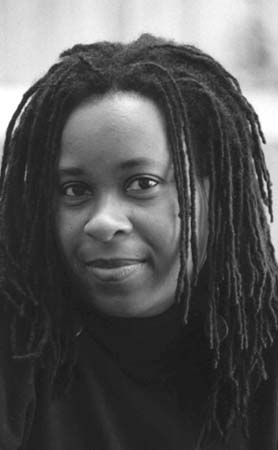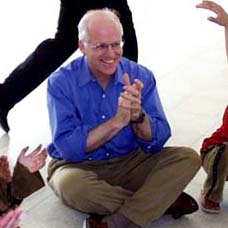2004.04.30: April 30, 2004: Headlines: COS - Central African Republic: Psychology: Religion: Baltimore Times: Central African Republic RPCV Evangeline Wheeler writes: Religious Experience and the Brain
Peace Corps Online:
Directory:
Central African Republic:
Peace Corps Central African Republic :
The Peace Corps in the Central African Republic:
2004.04.30: April 30, 2004: Headlines: COS - Central African Republic: Psychology: Religion: Baltimore Times: Central African Republic RPCV Evangeline Wheeler writes: Religious Experience and the Brain
Central African Republic RPCV Evangeline Wheeler writes: Religious Experience and the Brain

"Spiritual experiences are so consistent across all cultures that it suggests the human brain is somehow prewired for this. Because life can offer serious unexpected and ongoing challenges, we survive better if we can maintain faith in an uncertain world. So, maybe, the theory goes, the highly developed and complex human brain has helped us to develop the capacity for faith. Eventually, researchers hope to identify a common biological core in the world’s many varieties of worship."
Central African Republic RPCV Evangeline Wheeler writes: Religious Experience and the Brain
Wired for Faith: Religious Experience and the Brain
by Evangeline A. Wheeler, Ph.D.
Baltimore Times
Originally posted 4/30/2004
Is the spiritual urge programmed into the brain’s neural structure? For more than a century, the nature of religious experience has been a topic of considerable philosophical debate, yet virtually nothing is known of its biological underpinnings. In other words, we know little about how the brain itself is involved in religious experience. Until the 1970s, religious experience and activity were believed to be purely cultural phenomena, a product of social conditioning, and not in any way biological. Little effort was made to investigate the physiological aspects of, say, ritual or chant.
What we do know is that when people deeply believe they will be helped (or hurt) by something, bodily changes occur from those thoughts that can affect your physical health. Our traditional African and African American faith communities have long been at odds with the scientific paradigm over the relationship between religious faith and physical healing.
The notion that faith heals, as in “laying on of hands,” was heretofore unfounded scientifically and was in fact considered a ridiculous subject of serious scientific research. But, fifteen or twenty years ago psychological research into the relationship between our cognitions and our physical health began to show that religious beliefs, including faith in a “higher power,” could sometimes have important effects on our physical states. For instance, heart surgery patients who are religious have 20 percent shorter postoperative hospital stays than nonreligious patients. Significant research shows that people who pray on a regular basis enjoy higher levels of psychological health than the public at large.
With the aid of new technology that allows them to watch the brain in action, a group of scientists described as neurotheologists are trying to explain how the function of the brain relates to religious experiences. Evidence from cognitive science research even suggests provocatively that the human brain is pre-wired for religious experience, since the discovery that there may be circuits in the human brain specifically involved in religious experience.
Spiritual experiences are so consistent across all cultures that it suggests the human brain is somehow prewired for this. Because life can offer serious unexpected and ongoing challenges, we survive better if we can maintain faith in an uncertain world. So, maybe, the theory goes, the highly developed and complex human brain has helped us to develop the capacity for faith. Eventually, researchers hope to identify a common biological core in the world’s many varieties of worship.
This new, controversial, research tries to uncover what is happening in our brains when we encounter religious, spiritual and mystical experiences. In one type of experiment, for example, brain scans examine parts of the brain that are activated or quieted during deep prayer or meditation. The interruptions in brain circuits due to focused spiritual contemplation effect changes in our thought processes and influence our subconscious mind.
In another kind of experiment, inducing bursts of electrical impulses to certain areas of the brain simulates mystical and religious experiences.
And besides causing seizures, temporal lobe epilepsy can lead to unusual, hallucinatory, mental experiences, with people sometimes reporting deeply moving spiritual experiences, and a subsequent preoccupation with religion. When parts of the epileptic brain are destroyed surgically, the seizures and the mystical experiences associated with them, go away.
Interest in the science of religious experience is linked to the observation that many of the aspects of mystical experiences are a regular part of everyday life for persons with certain brain dysfunctions. It was observed that persons with a certain kind of brain damage experience great difficulty in distinguishing between themselves and the rest of the world. This condition makes it difficult, for example, for someone to walk around, because he’s unsure of where the floor ends and his foot begins, or even to sit down, because he doesn’t know where his body ends and the chair begins. This is like the religious experience reported by deep meditators, of being “at one” with the universe.
Throughout human history, mystical techniques were intuitively devised by shamans and spiritual masters — ways like prayer, chanting, meditation or ritual — to trigger the process of “deafferentation,” leading to various degrees of unitary states, in turn perpetuating human spirituality. This could be why truly spiritual people tend to be calm, peaceful, compassionate and caring and lead healthy and happy lives. Their sense of oneness makes them emotionally balanced and spiritually developed. Ironically, the American Psychiatric Association listed “strong religious belief” as a disorder in their diagnostic manual as late as 1974.
The possibility that we are intrinsically wired for spirituality cannot be dismissed; the complexities of religious variation may well grow from blueprints in the brain that have evolved over the millennia. But, as has been the case with all past attempts to prove the presence of a higher power, brain scans and cerebral anatomy, so far, fall short of doing so.
Evangeline A. Wheeler, Ph.D. is the Associate Professor of Psychology, Towson University
ewheeler@towson.edu
When this story was posted in September 2006, this was on the front page of PCOL:





Peace Corps Online The Independent News Forum serving Returned Peace Corps Volunteers
 | He served with honor
One year ago, Staff Sgt. Robert J. Paul (RPCV Kenya) carried on an ongoing dialog on this website on the military and the peace corps and his role as a member of a Civil Affairs Team in Iraq and Afghanistan. We have just received a report that Sargeant Paul has been killed by a car bomb in Kabul. Words cannot express our feeling of loss for this tremendous injury to the entire RPCV community. Most of us didn't know him personally but we knew him from his words. Our thoughts go out to his family and friends. He was one of ours and he served with honor. |
 | Chris Shays Shifts to Favor an Iraq Timetable
In a policy shift, RPCV Congressman Chris Shays, long a staunch advocate of the Bush administration's position in Iraq, is now proposing a timetable for a withdrawal of American troops. How Mr. Shays came to this change of heart is, he says, a matter of a newfound substantive belief that Iraqis need to be prodded into taking greater control of their own destiny under the country’s newly formed government. As Chairman of the House Government Reform subcommittee on national security, he plans to draft a timetable for a phased withdrawal and then push for its adoption. A conscientious objector during the Vietnam War who said that if drafted he would not serve, Chris Shays has made 14 trips to Iraq and was the first Congressman to enter the country after the war - against the wishes of the Department of Defense. |
 | Peace Corps' Screening and Medical Clearance
The purpose of Peace Corps' screening and medical clearance process is to ensure safe accommodation for applicants and minimize undue risk exposure for volunteers to allow PCVS to complete their service without compromising their entry health status. To further these goals, PCOL has obtained a copy of the Peace Corps Screening Guidelines Manual through the Freedom of Information Act (FOIA) and has posted it in the "Peace Corps Library." Applicants and Medical Professionals (especially those who have already served as volunteers) are urged to review the guidelines and leave their comments and suggestions. Then read the story of one RPCV's journey through medical screening and his suggestions for changes to the process. |
 | The Peace Corps is "fashionable" again
The LA Times says that "the Peace Corps is booming again and "It's hard to know exactly what's behind the resurgence." PCOL Comment: Since the founding of the Peace Corps 45 years ago, Americans have answered Kennedy's call: "Ask not what your country can do for you--ask what you can do for your country. My fellow citizens of the world: ask not what America will do for you, but what together we can do for the freedom of man." Over 182,000 have served. Another 200,000 have applied and been unable to serve because of lack of Congressional funding. The Peace Corps has never gone out of fashion. It's Congress that hasn't been keeping pace. |
 | Chris Dodd considers run for the White House
Senator Chris Dodd plans to spend the next six to eight months raising money and reaching out to Democrats around the country to gauge his viability as a candidate. Just how far Dodd can go depends largely on his ability to reach Democrats looking for an alternative to Hillary Clinton. PCOL Comment: Dodd served as a Volunteer in the Dominican Republic and has been one of the strongest supporters of the Peace Corps in Congress. |
 | Peace Corps stonewalls on FOIA request
The Ashland Daily Tidings reports that Peace Corps has blocked their request for information on the Volkart case. "After the Tidings requested information pertaining to why Volkart was denied the position — on March 2 — the newspaper received a letter from the Peace Corps FOIA officer stating the requested information was protected under an exemption of the act." The Dayton Daily News had similar problems with FOIA requests for their award winning series on Volunteer Safety and Security. |
 | PCOL readership increases 100%
Monthly readership on "Peace Corps Online" has increased in the past twelve months to 350,000 visitors - over eleven thousand every day - a 100% increase since this time last year. Thanks again, RPCVs and Friends of the Peace Corps, for making PCOL your source of information for the Peace Corps community. And thanks for supporting the Peace Corps Library and History of the Peace Corps. Stay tuned, the best is yet to come. |
 | History of the Peace Corps
PCOL is proud to announce that Phase One of the "History of the Peace Corps" is now available online. This installment includes over 5,000 pages of primary source documents from the archives of the Peace Corps including every issue of "Peace Corps News," "Peace Corps Times," "Peace Corps Volunteer," "Action Update," and every annual report of the Peace Corps to Congress since 1961. "Ask Not" is an ongoing project. Read how you can help. |
 | RPCV admits to abuse while in Peace Corps
Timothy Ronald Obert has pleaded guilty to sexually abusing a minor in Costa Rica while serving there as a Peace Corps volunteer. "The Peace Corps has a zero tolerance policy for misconduct that violates the law or standards of conduct established by the Peace Corps," said Peace Corps Director Gaddi H. Vasquez. Could inadequate screening have been partly to blame? Mr. Obert's resume, which he had submitted to the Peace Corps in support of his application to become a Peace Corps Volunteer, showed that he had repeatedly sought and obtained positions working with underprivileged children. Read what RPCVs have to say about this case. |
 | Why blurring the lines puts PCVs in danger
When the National Call to Service legislation was amended to include Peace Corps in December of 2002, this country had not yet invaded Iraq and was not in prolonged military engagement in the Middle East, as it is now. Read the story of how one volunteer spent three years in captivity from 1976 to 1980 as the hostage of a insurrection group in Colombia in Joanne Marie Roll's op-ed on why this legislation may put soldier/PCVs in the same kind of danger. Latest: Read the ongoing dialog on the subject. |
Read the stories and leave your comments.

Some postings on Peace Corps Online are provided to the individual members of this group without permission of the copyright owner for the non-profit purposes of criticism, comment, education, scholarship, and research under the "Fair Use" provisions of U.S. Government copyright laws and they may not be distributed further without permission of the copyright owner. Peace Corps Online does not vouch for the accuracy of the content of the postings, which is the sole responsibility of the copyright holder.
Story Source: Baltimore Times
This story has been posted in the following forums: : Headlines; COS - Central African Republic; Psychology; Religion
PCOL34205
49






















